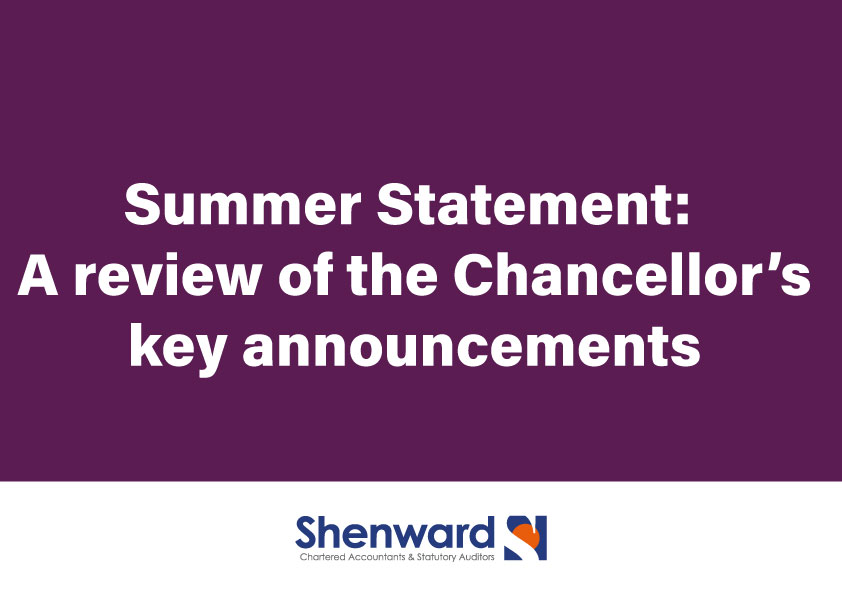Summer Statement: A review of the Chancellor’s key announcements
In a bid to minimise the economic impact caused by the coronavirus pandemic, yesterday (8 July 2020) the Chancellor made a summer statement mini-budget announcement to the nation.
Whilst we welcome the government support and appreciate the governments’ efforts to support the economy, we again await further guidance on claims processes and eligibility.
Here, we take a look the measures announced to support the rebuilding of the economy and what this might mean for you.
Job Retention Scheme
In a surprising turn of events, Chancellor Rishi Sunak announced further pots of money would be made available for those employers already utilising the Coronavirus Job Retention Scheme.
Under the new rules, each employee who is brought off furlough and is continuously employed until January 2021 will receive a £1000 bonus. It is not yet clear from when the employee must be brought back to work from and if employees already returned to work would be eligible.
Whilst the criteria and claims guidance are still to be announced, what we do know is
To be eligible, employees will need to:
- earn at least £520 per month (above the Lower Earnings Limit) on average for November, December and January
- have been furloughed by you at any point and legitimately claimed for under the Coronavirus Job Retention Scheme
- have been continuously employed by you up until at least 31 January 2021.
Employers will be able to claim the bonus from February 2021 once accurate RTI data to 31 January has been received. More information about this scheme will be available by 31 July and full guidance will be published in the Autumn.
We also predict that Directors/Shareholders who were not eligible for the self-employment grant but were placed on furlough, may find some respite in claiming £1,000 bonus for each director retained on the payroll.
Kickstarter Scheme
It had already been mentioned that £2.1bn would be invested in the Kickstarter scheme to create new jobs for 16 to 24-year olds, but the Chancellor added further, although limited, insight into how this will work.
Under the scheme, employers creating entirely new jobs will be able to claim wages and overheads as long as they can prove these are new roles. In addition, the scheme will allow six-month work placements for young people on Universal Credit to be subsidised in an attempt to rescue those at risk of unemployment.
Traineeship Scheme
Similarly to the Kickstarter Scheme, employers will be able to claim £1,000 to employ youngsters via traineeships. This includes work experience placements, training and work preparation for 16 to 24-year olds, and each can last from 6 weeks to 6 months.
Apprentices
All businesses looking to take on new apprentices will be able to claim £2,000 to employ youngsters between the ages of 16 and 24. However, businesses who take on apprentices older than 25 will be able to claim £1,500.
Green Energy
The pandemic raised awareness of just how much impact society’s lifestyles had on the environment and so the government are now looking at further ways to encourage people to become greener.
Under the new support measures, homeowners will receive vouchers to pay for at least two-thirds of green improvements to their homes including loft, wall and floor insulations.
Low-income households will also be eligible for up to 100% government funding to a maximum value of £10,000.
Stamp Duty
Moving away from jobs and employment, Mr Sunak announced a stamp duty ‘holiday’ in England and Northern Ireland starting yesterday (8 July 2020) and lasting until 31 March 2021.
This means that we will see a rise in the property value threshold at which stamp duty is paid, which will now increase to £500,000.
However, stamp duty is tiered, meaning different rates are applied to different price brackets. Below is a list of the newly updated tiers and rates.
Up to £500,000 – Zero %
£500,001 to £925,000 – 5%
£925,001 to £1.5m – 10%
Over £1.5m – 12%
We understand that buy to let landlords and 2nd home buyers will benefit from the increased thresholds, although the 3% surcharge will still apply.
VAT Reductions within the hospitality and tourism sectors
From 15 July 2020, VAT will temporarily be reduced from 20% to 5% for goods and services supplied by the tourism and hospitality sectors. Businesses within these sectors can apply the VAT reductions for six months.
However, it’s important to note that the VAT cut does not apply to alcoholic beverages, which means this may not entice people to drink out as the government hopes. Furthermore, from a professional point of view, it will introduce complexity in the VAT calculations.
Eating Out
In a bid to entice people to back into restaurants and help them begin to rebuild, for the month of August, there will be a 50% reduction in price of up to £10 per head on sit down meals and non-alcoholic drinks between Monday and Wednesday. This benefit will be available to both adults and children.
How it will be implemented for the public we don’t yet know, but we know that restaurants will have to register for the scheme in order to make claims.
Our concern is that this won’t be enough to encourage consumers to dine out given lingering safety concerns and a change in tastes. Lockdown has certainly changed consumers’ behaviours and so eating/drinking out is not as popular as it was.
Our team of friendly experts is always just on the other end of the phone, so if you’re struggling to digest the information or would like to chat about how this might affect you and your business, please feel free to get in touch.

